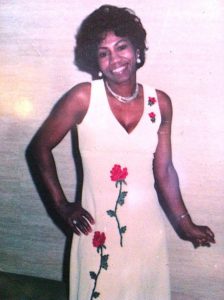This series, “What Is Mono?” includes poems from unpublished collections by Alice E. Van Pelt. This woman was the mother of yours truly’s beloved, a friend we’ll call Eros. He is devotional, magical, and absolutely inclusive in his love. Alice was Eros’s confidante and favorite parent. She left a legacy of poems and yours truly offered to take it on as form of devotion to Eros and his loss.
The Van Pelts are Presbyterians. In the North-East this denomination is not uncommon among African-Americans with deep roots in Unionist states. With its abstract, non-representational sense of the sacred, its exigent work ethic, it was probably a belief system that sustained them better in the industrialized economy of the Eastern Seaboard. Alice’s poetry is very religious, and very inspiring in that way. There is a fervor, a devotion, that marks it as genuine, heartfelt. The words dance on the page and recollect themselves in a gentle prayer, as in the poem you’ll find below, to Alice’s two sons.
However, Alice’s vision is just so far removed from that of the African American women’s voices that have guided yours truly to first question the ideology behind the single white male deity Christians call “God.” As in, for example, Ntozake Shange’s “i found god in myself and loved her, loved her fiercely.”
What was yours truly going to do with this legacy on a blog that’s devoted questioning that belief system and supporting others who do so?
Sometimes the contradictions, the inner conflicts of our lovers help us untangle some of our own. Eros is of course not a monotheistic person at this point. And yet there is a correspondence between his magic as an artist of love and Alice’s as a wordsmith.
Yours truly often claims that monogamy is not the opposite of polyamory but just a special case of it. The number “1” just happens to be the first in an infinite series that includes it. By the same token, monotheism is just a special case of polytheism. The infinite, not the one, is where the whole resides.
“Polytheism, polyamory, are just more inclusive, that’s all,” yours truly claims. But then, does that alleged inclusiveness give one the right to exclude monotheism and monogamy–to declare them obsolete, prejudiced, or wrong?
If we who believe in poly truly believe that poly is inclusive we need to practice that by including mono, no?
So that’s how yours truly came to accept Alice’s poems. And, guess what, once she did, the poems acquired a whole new meaning.
For example, the poem to Alice’s sons below: is it only to her own two biological sons? Can it not be read as a poem to all of the “sons” Alice’s poetic voice embraces? An invocation to action, to resilience, to self knowledge, to self possession, to extending the embrace well beyond the poet’s family or denomination? As yours truly reads the poems again without prejudice against monotheism, their ecumenical, inclusive values become transparent. Their evangelical message is one of courage and awareness for the infinite that is the whole.
A LETTER TO MY SONS
part of the Negro’s history.
Our strength is in the young today
From the poetry collection of Alice E. Van Pelt, published here with permission from her descendants, gratefully acknowledged.
And since it’s everywhere, then it may as well be a “one” that’s form to the many.
Did you enjoy the post? Let us know! Yours truly appreciates your attention. The comments box is open.
Namaste,
Professor of Humanities
University of Puerto Rico, Mayaguez









